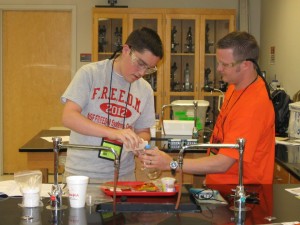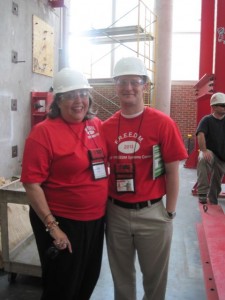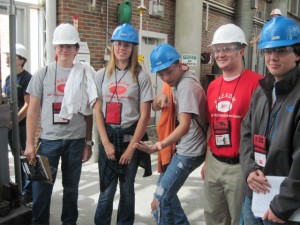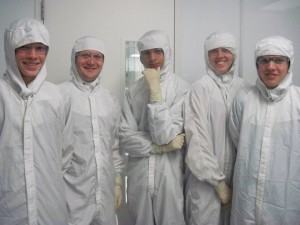Looking at the Common Core and Essential Standards, I feel they will end up having a positive aspect on teaching and using technology. Even though they are cumbersome and difficult to get through at times, the use of technology will increase. However I feel as though good teaching would continue to find new innovative ways to deliver and interact with their students. The idea that the standards will force/guide teachers to use technology is not typically the best route. Teachers, especially those who are intimidated by new technology will see the standards as a checklist and not necessarily change to what is better for their students. Good teaching will continue without the standards for technology, however the common core may force some teachers who might not have tried anything new to attempt something different. I guess that is movement in the right direction.
Monthly Archives: July 2013
Relating Renewable Energy to Chemistry
When it comes to relating my externship to curriculum, there shouldn’t be a problem. Energy is in every science class’s curriculum in some form or another. For chemistry it applies in multiple topics so I had a couple of ways to approach it and apply it to my curriculum. I have chosen to focus on the renewable aspect and relate one of my experiences where I was given a chance to go into a research lab. The lab was at NCSU School of Textiles where I was able to watch nano-fibers be created and then used in creating rechargeable lithium ion batteries.
This experience gave me an opportunity to take a rather boring topic and think of new ways to introduce and relate the idea of a battery in chemistry class. I am hoping to relate the new research that I have witnessed and show students how it can relate to multiple topics that are learned in class. There are so many ways to introduce chemistry and energy into class and that is probably the biggest aspect that I have taken away from my externship. I need to find more ways to relate and demonstrate how chemistry is being used in cutting edge research and is affecting aspects of the students everyday lives.
How Many People Understand Electrcity and Where It Comes From?
This is my second summer with the FREEDM System Center at NCSU participating as an RET (research experience for teachers), learning about energy and electricity. This placement is great! If you are interested in learning and getting tons of opportunities to experience energy in your everyday life then you would like this placement. Over the five weeks of the program, a group of students and teachers perform labs and activities, take field trips and complete a research project working with PhD students at NCSU that involve electrical engineering
Many of the experiments that are done are actual activities that I have used or adapted for my classroom. The best part about them is getting to work with the students as they complete the experiments. It allowed me to see how they are approaching the activities and how to adapt it so it can be more successful in the classroom setting. I was able to see where they struggled, and what aspects of the activity caused the misunderstanding.
The field trips are probably the best part of the experience. I have been able to see many things in a short period of time that I normally would have not get a chance to experience. All of the fieldtrips are real world and relate directly to our energy usage at home. Just to name a few: UNC Cogeneration Power Plant, Harris Nuclear Power Plant, NCSU Clean Room, Duke Power Distribution Center, and CIsco. Again taking these trips with students and getting to sit back and watch their experience, hearing their questions and seeing their reactions was a great insight to how they view energy in the world around them.
The biggest challenge is working the PhD students on the research project. This year our project was creating system to place a PV system on an average single family home to reduce electrical power consumption during peak time. I have forgotten how much math was needed and how difficult it is to learn a lot of new material in a short amount of time. However we created a great product that can be used by almost anyone to create an estimate on how much it would cost to put a PV array on your home. It can even be adapted for a classroom project on solar energy. Here are few photos from the experience:
Can We Keep Up?
Leveraging technology? I think the question actually becomes; are you keeping up with the times? Just like teaching is an ever changing craft that requires the professionals to change/adjust their approach constantly to be successful, technology is lumped in the same way. In order to keep up and reach as many students as possible, teachers need to keep up and use the technology the students are using. This is the biggest challenge for me. It is not whether or not I can use or understand the technology but rather can I keep up with the changes in technology to learn them quick enough or afford them in my personal life to incorporate them. By the time we develop or start to use the technology in the classroom and get comfortable using it, something changes and our approach changes. This causes to find a new technology or technique.
We will always have to find ways to bring technology into places that are strapped for funding, I think we are all used to that, but it is going to change every year or two, so can we change that rapidly to reach them? I guess we have to, don’t we?
A Week of Peace and Quiet
Believe it or not it was much tamer than the everyday stress of trying to get a 1 and 3 year old out of bed in the morning for daycare, rushing to pick them up after my externship and the nightly routine of getting them to bed. Don’t get me wrong it was very difficult to be away but the time away allowed for better team building and focus while meeting all the fellows.
The 2 things that pop into my mind when thinking about the highlights of the trip are getting a chance to interact and see what the Kenan Fellow alumni are doing and of course getting know and spend time with 49 of NC’s finest teachers.
Actually witnessing and speaking to the likes of Paul, Justin and the many other alumni was a valuable experience. I was able to get an idea of the places we can go and what innovative things we are expected to do. This was probably the most exciting aspect as well as the most concerning. We are expected to experiment and try new things which for many of us involves changing the way we have done things, not easy once we get comfortable. This idea that we need to grow and innovate within our classrooms to lead fellow teachers did not hit me until end of the week when I had a chance to digest a little bit on the drive home. As I have been thinking about this leading the way and changing our practices, my second highlight came into my mindset.![TxqEM7vczZ7vdzsf6w9Uqf5i_1ghRqyDJOqBVYNfpFQ,047EIk8qd5W4IUJONWmPrQS4YvHBE0kmAKfzuSnxPP4[2]](http://kenanfellows.org/2014-bvoneitzen/wp-content/uploads/sites/128/2013/07/TxqEM7vczZ7vdzsf6w9Uqf5i_1ghRqyDJOqBVYNfpFQ047EIk8qd5W4IUJONWmPrQS4YvHBE0kmAKfzuSnxPP42-300x225.jpg)
![UrV-B0OyKCMxtTmzAjacOXnoHQ1ypQ_e3APi9Q2DqIg,vLJhwkgeRB1in63dSWc1x697uknr-67Qtas-vIdHNKY[1]](http://kenanfellows.org/2014-bvoneitzen/wp-content/uploads/sites/128/2013/07/UrV-B0OyKCMxtTmzAjacOXnoHQ1ypQ_e3APi9Q2DqIgvLJhwkgeRB1in63dSWc1x697uknr-67Qtas-vIdHNKY1-300x225.jpg)
We are in a group of nearly fifty extraordinary teachers who all have their own strengths. After spending our week together this was very evident. From team building day 1, to rafting to struggling through technology issues to learn the new things that were presented, we have all the resources within our group to be successful. Spending time and learning about everyone shows that we are a diverse group that can accomplish great things in many different areas.
How do we take all of our learning back so that our colleagues can gain from the experiences?
Do I have the drive to change and try new techniques in my classroom?



